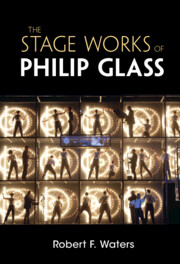Book contents
- The Stage Works of Philip Glass
- The Stage Works of Philip Glass
- Copyright page
- Dedication
- Contents
- Figures
- Tables
- Music Examples
- Selected Stage Works of Philip Glass
- Preface
- Acknowledgments
- Part I Background
- Part II Stage Works
- Chapter 5 Theater
- Chapter 6 Language and Philosophy
- Chapter 7 Themes, Genres, and Archetypes
- Chapter 8 Multimedia and Hybrid Genres
- Chapter 9 Dance
- Chapter 10 Music
- Chapter 11 Critical and Audience Reception
- Chapter 12 Conclusion
- Notes
- Select Bibliography
- Index
Chapter 12 - Conclusion
from Part II - Stage Works
Published online by Cambridge University Press: 21 July 2022
- The Stage Works of Philip Glass
- The Stage Works of Philip Glass
- Copyright page
- Dedication
- Contents
- Figures
- Tables
- Music Examples
- Selected Stage Works of Philip Glass
- Preface
- Acknowledgments
- Part I Background
- Part II Stage Works
- Chapter 5 Theater
- Chapter 6 Language and Philosophy
- Chapter 7 Themes, Genres, and Archetypes
- Chapter 8 Multimedia and Hybrid Genres
- Chapter 9 Dance
- Chapter 10 Music
- Chapter 11 Critical and Audience Reception
- Chapter 12 Conclusion
- Notes
- Select Bibliography
- Index
Summary
In the USA, twentieth-century stage works with music have often been hybrid compositions, in that composers have often intermingled opera with other types of music, including ragtime in Scott Joplin’s Treemonisha (1911), jazz and blues elements in George Gershwin’s Porgy and Bess (1935), Kurt Weill’s Street Scene (1946), and Leonard Bernstein’s Trouble in Tahiti (1952) and Candide (1956), as well as characteristics adapted from musicals in Stephen Sondheim’s opera Sweeney Todd (1979). For Glass, however, the template differed in that he emphasized avant-garde theater. Throughout the 1990s, many critics who had hailed Glass in the 1980s began to doubt the quality of Glass’s output and believed he had deteriorated as a composer. Other critics argued that Glass had become complacent and that this affected the quality of his work. And some journalists indicted Glass for not spending enough time on any one work because he accepted too many commissions. Yet Glass attributes his immense popularity with audiences to “good work habits” and to his being a collaborative “music theater composer.” Opera has reemerged since the early 1980s as immensely popular, and Glass has been responsible for helping to invigorate this resurgence.
- Type
- Chapter
- Information
- The Stage Works of Philip Glass , pp. 199 - 204Publisher: Cambridge University PressPrint publication year: 2022



